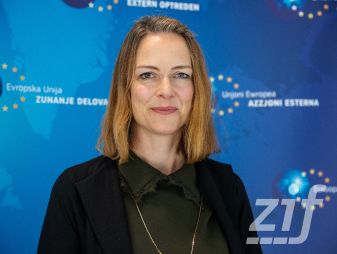Janna Greve
Policy Officer – Peace Mediation and Dialogue
European External Action Service (EEAS) - Brussels
period of employment: since August 2022
Previous stations
- 2013-2016 and 2021-2022 ZIF secondments to the OAS mission to support the peace process in Colombia (MAPP-OEA)
- Several years of professional experience in international organizations, with a focus on sub-Saharan Africa and the main topics of peace mediation, transitional justice, inclusive conflict resolution as well as climate security and humanitarian aid
- PhD student at the Institute of Criminology at the KU Leuven / Belgium on the topic of transitional justice
In my position as ....
Policy Officer - Peace Mediation and Dialogue, I am one of four experts in the Mediation Support Team (MST). The MST is based in the Peace, Partnerships and Crisis Management Directorate of the European External Action Service (EEAS) in Brussels. We provide support in the field of peace mediation and dialog for the prevention and resolution of armed conflicts - as an integral part of European foreign policy. As part of our mandate and on the basis of key guideline documents (e.g. EU Concept on Peace Mediation and EEAS Peace Mediation Guidelines), we support mediation and dialog processes at various levels. This support includes the provision of additional expertise for EU delegations, for EU Special Representatives or for external political and civil actors. Furthermore, we support the identification of new mediation measures with implementation partners of the Community of Practice and strengthen the dialog with key regional actors such as the African Union or the UN.
My geographical areas of responsibility are currently the Horn of Africa and Latin America, with a focus on transitional justice and women, peace and security (WPS). With regard to WPS, I support the gender-sensitive implementation of peace mediation and dialog processes as well as the consistent participation of women, especially as mediators.
In particular, supporting the team of the Special Envoy for the Horn of Africa with regard to Sudan has made me aware of the importance of the inclusion of civilian actors in dialog and political processes.
The biggest challenge in my work is...
the general increase in armed conflicts and violent tensions, new conflict actors and mechanisms, and the partial departure of some political actors from multilateralism. Many current conflict contexts are characterized by constantly changing dynamics and a multitude of external actors.
With regard to mediation as an integral part of EU foreign policy, this also means paying attention to coordination and complementarity - and, with the aim of sustainable peace, to the involvement of local peace actors. Thus, cultivating relationships, creating awareness for mediation options even in complex conflict contexts and taking into account key issues such as WPS, transitional justice, ceasefire negotiations are part of the daily challenge.
The most impressive moments in my work so far have been ...
discussions with local actors during mediation scoping missions. These missions are carried out at the request of EU delegations in order to identify ways of operationalizing peace mediation. Where and how does peace mediation make sense? In February 2023 in Niger (before the coup), I was able to talk to employees of a communication project about the possibilities of radio work for reconciliation and the reduction of prejudices against stigmatized population groups. In Burkina Faso in March 2023, I spoke with young students about their commitment to dialog across ethnic boundaries and conflict resolution at the local level. In both countries, I was in contact with imams who work against religious extremism and for reconciliation and spoke with representatives of nomadic herders who help to reduce conflicts over water and land through mediation.
